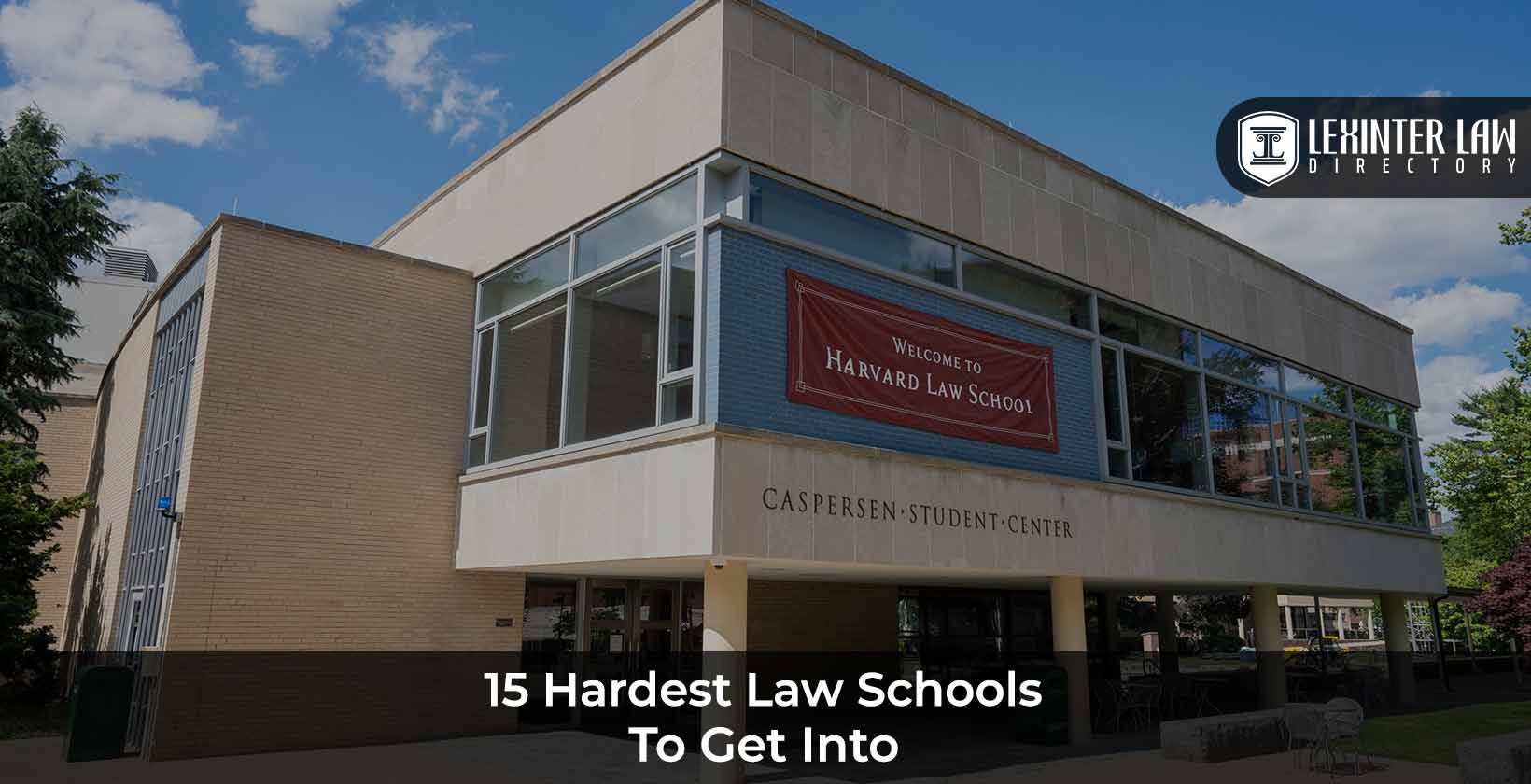15 Hardest Law Schools To Get Into
There are 15 hardest law schools to get into, and securing a spot in one of them demands exceptional academic performance, stellar LSAT scores, and a competitive application. The law schools are known for their selective admissions process, drawing applicants from across the globe who aim to be part of an elite legal education. Schools like Harvard and Yale dominate the rankings, with acceptance rates reaching as low as 9.58% and 5%, respectively. The rigorous criteria at the institutions reflect their prestige and the intense competition students face. Several other law schools feature prominently in the list of the hardest law schools to get into. Columbia Law School and the University of California, Berkeley School of Law are famous for their rigorous academic standards, making them highly sought after by top applicants. The University of Chicago Law School and Duke University School of Law follow close behind, known for their demanding selection processes and strong academic programs. Each of the institutions boasts a legacy of producing influential legal professionals who shape policy and law nationally and internationally. The hardest law schools represent the pinnacle of legal education, and gaining admission into any of the programs is a remarkable achievement.
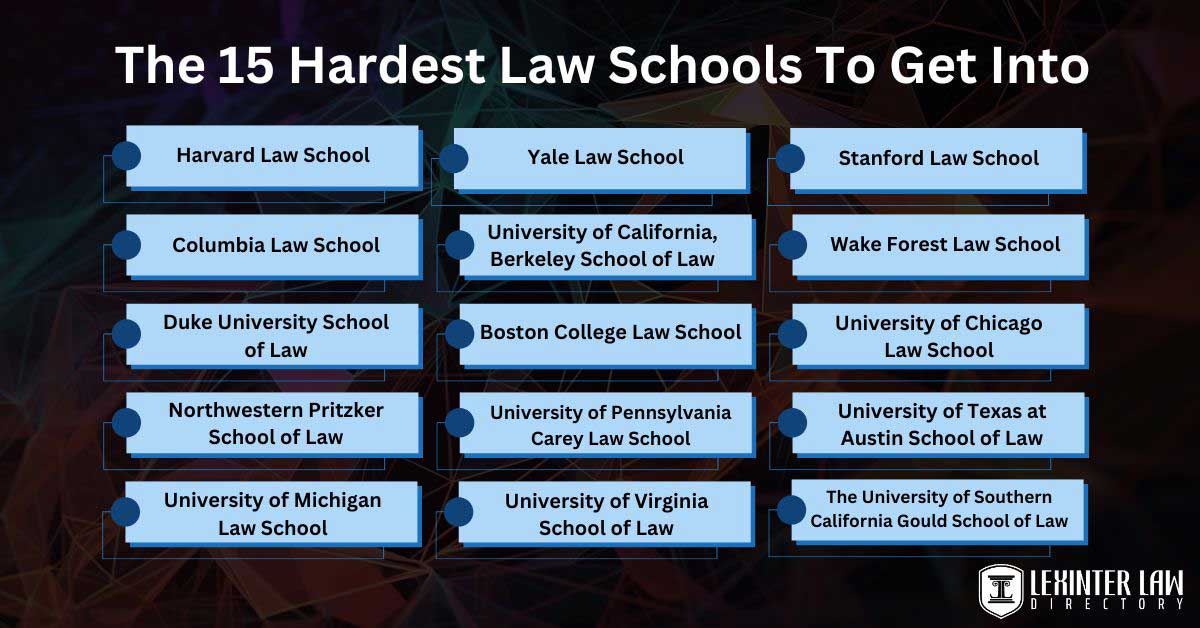
The 15 hardest law schools to get into are listed below.
- Harvard Law School: Harvard Law School, founded in 1817, ranks #4 by U.S. News in 2024. Harvard Law School is one of the hardest law schools to get into, with a 9.58% acceptance rate. Median LSAT and GPA scores are 174 and 3.93. Harvard offers J.D., LL.M., and S.J.D. degrees, with tuition exceeding $115,000. Graduates have a 96.10% Bar passage rate.
- Yale Law School: Yale Law School, founded in 1824, ranks #1 in U.S. News and has an acceptance rate of 5%, making the institution the most selective law school. The median LSAT and GPA are 175 and 3.96, respectively. Yale offers J.D., LL.M., and Ph.D. degrees with a tuition of $100,469. Graduates have a 96.8% Bar passage rate, reflecting academic rigor and prestige.
- Stanford Law School: Stanford Law School, founded in 1893, ranks #2 in U.S. News 2024. The law school is one of the hardest law schools to get into, with a 7.26% acceptance rate and median LSAT and GPA scores of 173 and 3.95. The school offers several law degrees, including the Juris Doctor (J.D.), Master of Laws (LL.M.), and Doctor of the Science of Law (J.S.D.). The tuition for the 2024 academic year is $73,713, with total costs, including living expenses, reaching $105,554 annually.
- Columbia Law School: Columbia Law School, established in 1858, ranks #8 in the U.S. News 2024 rankings. The law school is one of the hardest law schools to get into, with a 12.23% acceptance rate. The median LSAT score is 174, and the median GPA is 3.84. Columbia offers J.D., LL.M., Executive LL.M., and J.S.D. degrees. Tuition for the 2024-2025 academic year is $81,888, with total costs reaching $119,997 annually.
- University of California, Berkeley School of Law: The University of California, Berkeley School of Law, founded in 1894, is ranked #10 in the U.S. News 2024 rankings. The law school is one of the hardest law schools to get into, with a 14.9% acceptance rate. Median LSAT and GPA scores are 170 and 3.87, respectively. Berkeley Law offers J.D., LL.M., J.S.D., and Ph.D. degrees, specializing in intellectual property, environmental law, and corporate law. Tuition for 2024-2025 is $62,567 for California residents and $74,995 for non-residents, with total costs reaching $111,829.
- Wake Forest Law School: Wake Forest University School of Law, founded in 1894, is ranked #32 in U.S. News 2024. The law school is one of the hardest law schools to get into, with a 31.47% acceptance rate. Median LSAT and GPA scores are 165 and 3.79. The school offers J.D., LL.M., and S.J.D. degrees, with specializations in business, criminal, and intellectual property law. Tuition for 2024-2025 is $55,162, with total costs reaching $88,731 annually.
- Duke University School of Law: Duke University School of Law, founded in 1868, ranks #5 in U.S. News 2024 and is one of the hardest law schools to get into, with a 10.51% acceptance rate. The median LSAT score is 170, and the median GPA is 3.87. Duke offers J.D., LL.M., and S.J.D. degrees, with specializations in corporate law, constitutional law, and more. Tuition for 2024-2025 is $77,100, with total costs reaching $109,398.
- Boston College Law School: Boston College Law School, founded in 1929, ranks #29 in U.S. News 2024. The law school is one of the hardest law schools to get into, with a 13.38% acceptance rate. The median LSAT score is 167, and the median GPA is 3.77. BC Law offers J.D., LL.M., and dual degree programs, with specializations in business, tax, and environmental law. Tuition for 2024-2025 is $66,895, with total costs reaching $90,698.
- University of Chicago Law School: The University of Chicago Law School, founded in 1902, ranks #3 in U.S. News 2024. The law school is one of the hardest law schools to get into, with a 12% acceptance rate. The median LSAT score is 173, and the median GPA is 3.94. The school offers J.D., LL.M., and J.S.D. degrees with specializations in constitutional law, law and economics, and more. Tuition for 2024-2025 is $77,877, with total costs reaching $106,225.
- Northwestern Pritzker School of Law: Northwestern Pritzker School of Law, established in 1859, ranks #9 in U.S. News 2024 and is one of the hardest law schools to get into, with a 15.5% acceptance rate. The median LSAT score is 172, and the median GPA is 3.92. Northwestern, offering J.D., JD-MBA, and LLM degrees, emphasizes work experience, with over 90% of its students having full-time experience. Tuition for 2024-2025 is $74,552, with total costs reaching $99,872.
- University of Pennsylvania Carey Law School: The University of Pennsylvania Carey Law School, founded in 1850, ranks #4 in U.S. News 2024 and is one of the hardest law schools to get into, with a 9.7% acceptance rate. The median LSAT score is 172, and the median GPA is 3.92. The school, offering J.D., LL.M., and joint degree programs like JD/MBA, emphasizes cross-disciplinary learning. Tuition for 2024-2025 is $76,934, with total costs reaching over $105,000.
- University of Texas at Austin School of Law: The University of Texas at Austin School of Law, founded in 1883, ranks #16 in U.S. News 2024 and is one of the hardest law schools to get into, with a 14.9% acceptance rate. The median LSAT score is 171, and the median GPA is 3.86. Texas Law offers J.D., LL.M., and dual degrees like JD/MBA, specializing in business law and energy law. Tuition for 2024-2025 is $36,429 for Texas residents and $54,096 for non-residents, totaling $81,996.
- University of Michigan Law School: The University of Michigan Law School, founded in 1859, ranks #10 in U.S. News 2024 and is one of the hardest law schools to get into, with a 12.58% acceptance rate. The median LSAT score is 171, and the median GPA is 3.85. Michigan Law offers J.D., LL.M., and S.J.D. degrees, with specializations in international law and tax law. Tuition for 2024-2025 is $69,584 for Michigan residents and $72,584 for non-residents, with total costs reaching up to $96,984.
- University of Virginia School of Law: The University of Virginia School of Law, founded in 1819, ranks #4 in U.S. News 2024 and is one of the hardest law schools to get into, with an 11.46% acceptance rate. The median LSAT score is 171, and the median GPA is 3.94. UVA Law offers J.D., LL.M., and S.J.D. degrees, with specializations in business law and criminal justice. Tuition for 2024-2025 is $74,700 for residents and $77,700 for non-residents, with total costs reaching $105,870.
- The University of Southern California Gould School of Law: The University of Southern California Gould School of Law, founded in 1896, ranks #20 in U.S. News 2024 and is one of the hardest law schools to get into, with a 12.5% acceptance rate. The median LSAT score is 169, and the median GPA is 3.88. USC Gould offers J.D., LL.M., and specialized degrees in entertainment law and privacy law. Tuition for 2024-2025 is $78,038, with total costs reaching $108,000.
Table of Contents
- 1. Harvard Law School
- 2. Yale Law School
- 3. Stanford Law School
- 4. Columbia Law School
- 5. University Of California, Berkeley School Of Law
- 6. Wake Forest Law School
- 7. Duke University School Of Law
- 8. Boston College Law School
- 9. University Of Chicago Law School
- 10. Northwestern Pritzker School Of Law
- 11. University Of Pennsylvania Carey Law School
- 12. University Of Texas At Austin School Of Law
- 13. University Of Michigan Law School
- 14. University Of Virginia School Of Law
- 15. The University Of Southern California Gould School Of Law
- How To Choose Which Hardest Law School To Apply For?
- What Are The Benefits Of Getting Into A Highly Competitive Law School?
- What Are The Downsides Of Getting Into A Highly Competitive Law School?
- How Hard Is It To Get Into Law School?
- How Can Lexinter Help You Find Nearby Lawyers?
1. Harvard Law School
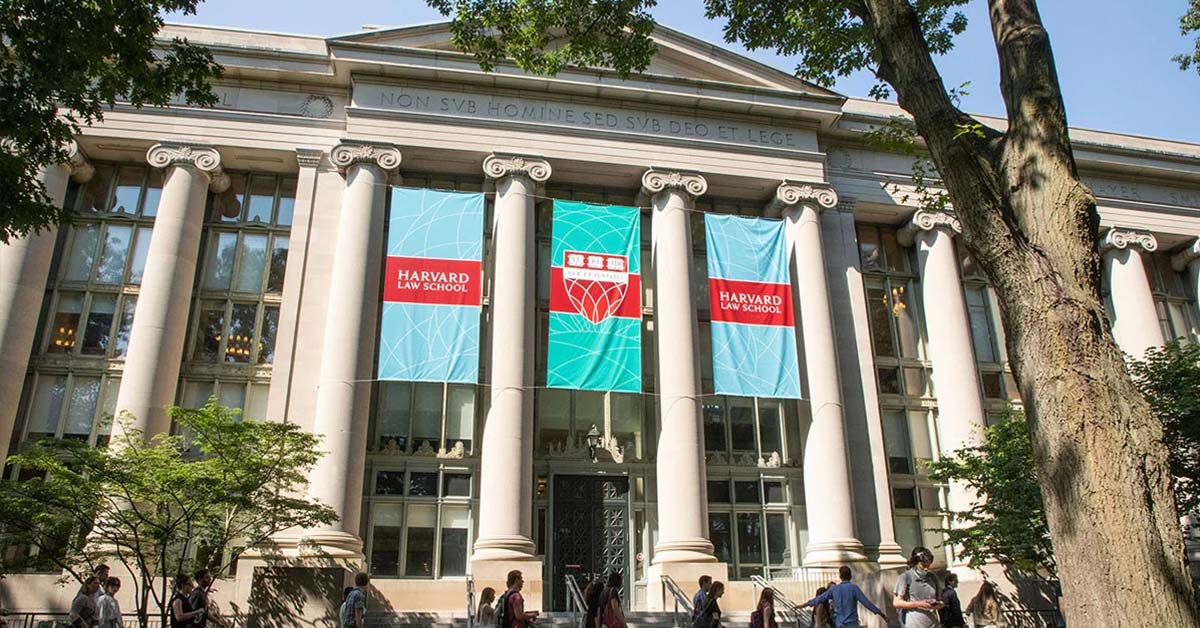
Harvard Law School, established in 1817, stands in Cambridge, Massachusetts, as one of the most prestigious law schools globally. The institution, ranked #4 by U.S. News & World Report in 2024, holds a prominent position among top-tier law schools. The school maintains highly competitive admissions, with an acceptance rate of only 9.58%, making entry extremely challenging. Harvard Law’s rigorous standards and a notable alumni network, including U.S. presidents and Supreme Court justices, underscore the school’s selectivity. The American Bar Association (ABA) has accredited the law school since 1923, reinforcing its reputation as a leading center for legal education.
Applicants must meet rigorous academic requirements to gain admission to Harvard Law School. The average Harvard LSAT score for admitted students is 174, with scores generally ranging from 170 to 176. A strong undergraduate GPA is crucial, with the median GPA at 3.93. The 25th to 75th percentile GPA range for accepted students is 3.82 to 3.98. Harvard Law requires applicants to submit a personal statement, resume, letters of recommendation, and responses to optional diversity or perspective statements. Work experience, although not mandatory, strengthens an application. The Harvard Law acceptance rate reflects just how competitive admissions are, making entry extremely challenging. Harvard Law boasts an impressive Bar exam passage rate. 96.10% of Harvard Law graduates passed the Bar exam on their first attempt in 2023, significantly higher than the national average of 77%. The high pass rate reflects the school’s exceptional academic rigor and the preparedness of its students for legal careers. The combination of academic excellence and comprehensive application requirements makes Harvard Law one of the most competitive law schools in the world.
Harvard Law School offers several prestigious law degrees, including the Juris Doctor (J.D.), the Master of Laws (LL.M.), and the Doctor of Juridical Science (S.J.D.). The J.D. is Harvard’s primary law degree, designed for students aiming for a comprehensive legal education. The LL.M. is a one-year advanced degree for students who have already earned their first law degree and wish to specialize further. The S.J.D. is an advanced, research-focused program designed for students pursuing academic or scholarly careers in law. Harvard offers various joint degree programs, including partnerships with Harvard Business School (J.D./MBA), the Harvard Kennedy School (J.D./MPP), and public health or urban planning programs. Specializations available at Harvard Law include constitutional law, human rights, business law, intellectual property, criminal justice, and more. Students tailor their studies through clinics, externships, and research centers. The tuition for Harvard’s J.D. program during the 2024-2025 academic year is approximately $78,692. The LL.M. program’s tuition is approximately $77,100. Students face living expenses, health insurance, and other fees, bringing the total annual cost to over $115,000. Financial aid and scholarships are available to help mitigate costs for qualifying students.
2. Yale Law School
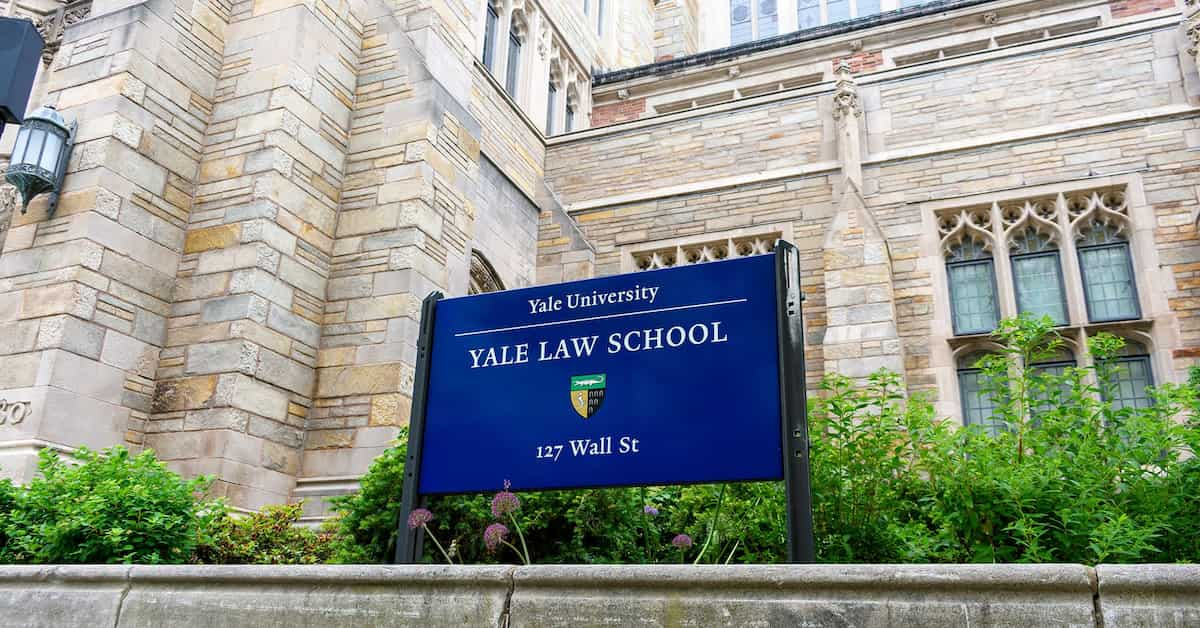
Yale Law School, founded in 1824, is located in New Haven, Connecticut, on Yale University’s campus. Yale Law School’s acceptance rate is approximately 5%, making the institution the most selective law school in the country. The Yale acceptance rate reflects the institution’s renowned academic rigor and prestige. The law school consistently ranks #1 in the U.S. News & World Report rankings due to its academic excellence and faculty quality. The challenge of getting into Yale Law is heightened by the limited class size, which accepts only around 200 students each year. Yale Law’s accreditation by the American Bar Association (ABA) guarantees adherence to the country’s top standards of legal education.
Yale Law School has highly competitive admission requirements. The average LSAT score for Yale is 175, with a GPA average of 3.96. The Yale Law average GPA of 3.96 highlights the high academic standards required for admission. Applicants are required to submit letters of recommendation, a personal statement, and a 250-word essay on a topic of interest in addition to the academic metrics. Yale values academic excellence and a strong commitment to public service and leadership. Yale Law graduates perform exceptionally well on the Bar exam, with a passage rate of approximately 96.8% for first-time takers in 2023. The rate is significantly higher than Connecticut’s average, which is about 79.5%. The statistics highlight Yale’s reputation for preparing students rigorously for the legal profession.
Yale Law School offers several law degrees, including the Juris Doctor (J.D.), Master of Laws (LL.M.), Doctor of the Science of Law (J.S.D.), and a specialized Ph.D. in Law. The degrees cater to a range of academic and professional goals, from practicing law to engaging in high-level research and teaching. Yale Law offers joint degree programs, combining law with other disciplines like business, public health, and environmental studies through collaboration with other Yale graduate programs. Specializations at Yale Law cover a variety of fields, including constitutional law, corporate law, human rights law, criminal justice, environmental law, and technology and media law. The tuition fee at Yale for the 2024-2025 academic year is $76,369. Living costs are estimated at around $24,100, bringing the total cost of attendance to $100,469. 63% of students receive grants or scholarships, with an average award of $32,852, significantly reducing the net cost for many students.
3. Stanford Law School
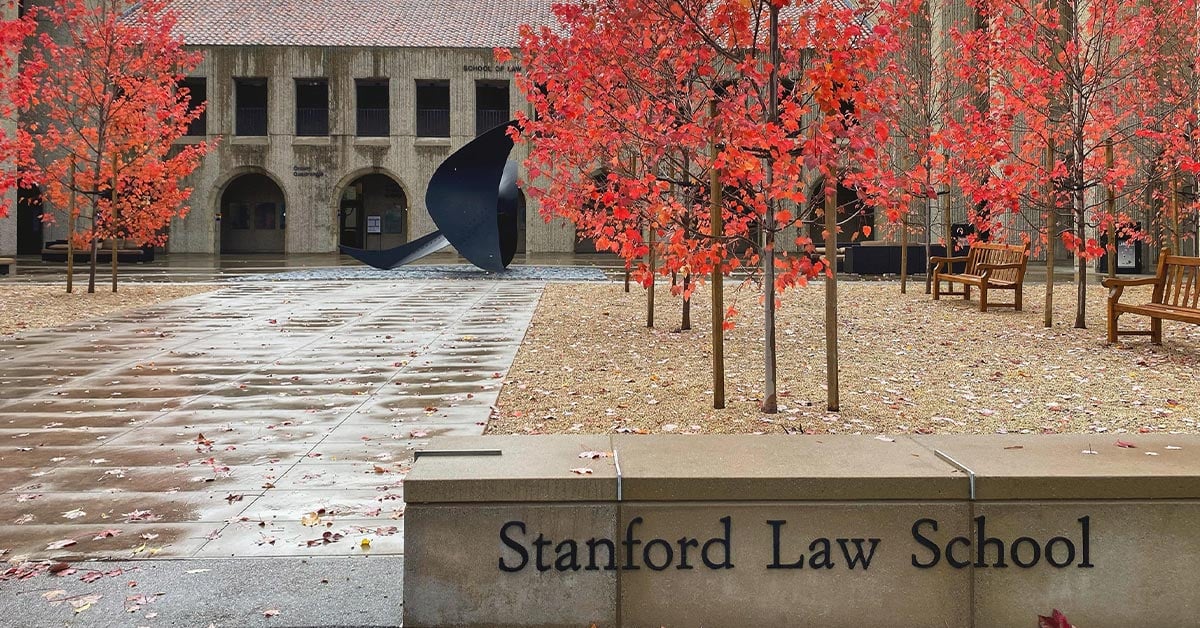
Stanford Law School, founded in 1893, is located in Stanford, California, near Palo Alto, at the center of Silicon Valley. The law school’s proximity to major tech and legal hubs enhances the interdisciplinary approach to legal education. Stanford has a highly selective admissions process, with an acceptance rate of 7.26% in 2024. Stanford is consistently ranked among the top law schools in the U.S., securing the #2 spot in U.S. News & World Report rankings, trailing only Yale Law School. The rigorous admissions process and interdisciplinary focus on technology, innovation, and public policy make Stanford one of the hardest law schools to enter. Stanford Law School is accredited by the American Bar Association (ABA), ensuring the establishment meets the highest standards in legal education.
The median Stanford LSAT score of accepted students is 173, and the median GPA is 3.95, reflecting the school’s high academic standards. Applicants must provide letters of recommendation, a personal statement, a résumé, and optional essays. The materials allow them to showcase their experiences and motivations beyond their academic achievements. Stanford places a strong emphasis on well-rounded candidates with leadership experience and diverse backgrounds. The school accepts GRE scores as an alternative to the LSAT, offering a more flexible admissions process. Stanford Law School graduates consistently achieve a high success rate in Bar exam performance. Stanford Law School’s 2023 graduates had a Bar passage rate of 96.70%, significantly above the national average, reflecting the school’s rigorous preparation.
The law school offers several law degrees, including the Juris Doctor (J.D.), Master of Laws (LL.M.), Master of the Science of Law (J.S.M.), and the Doctor of the Science of Law (J.S.D.). The programs cater to students seeking careers in law practice, academia, or policy-making. Stanford offers joint degree programs, allowing students to combine law with business, computer science, or education. Stanford Law offers courses and clinics in various specializations, including environmental law, corporate governance, criminal justice, international law, human rights, and intellectual property. The tuition fee at Stanford for the 2024 academic year is approximately $73,713. The total cost of attendance, including living expenses and fees, reaches about $105,554. 58% of students receive grants or scholarships, with the average aid amount being $34,199, significantly reducing attendance costs.
4. Columbia Law School
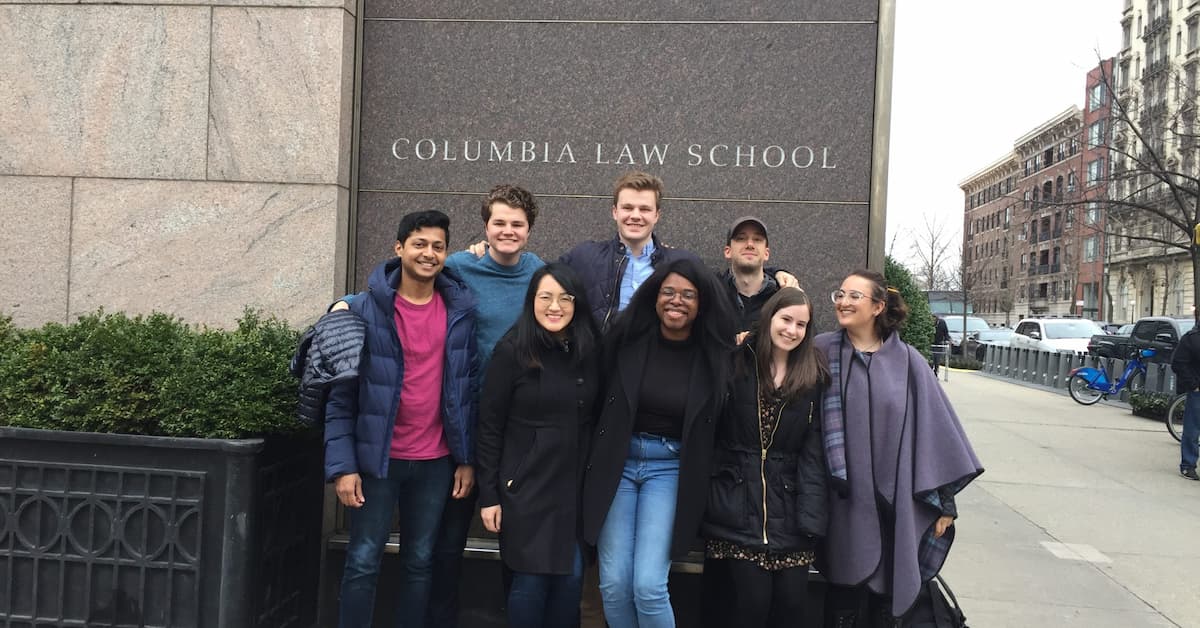
Columbia Law School, established in 1858, is located in New York City at 435 West 116th Street, in the center of Manhattan. Columbia, one of the oldest law schools in the United States, is renowned for legal scholarship and a significant influence on national and international law. The law school is highly competitive and difficult to gain admission to, with an acceptance rate of 12.23%. The Columbia Law acceptance rate reflects the selectivity and rigorous standards of the admissions process. Columbia Law School is ranked #8 in the 2024 U.S. News & World Report law school rankings. The school’s strong emphasis on producing leaders in law, government, and business, combined with a challenging curriculum, makes the program one of the hardest to get into. ABA accreditation at Columbia confirms that the programs meet the top standards in legal education.
Applicants must meet rigorous academic standards to gain admission to Columbia Law School in 2024. The median LSAT score for admitted students is 173, with scores generally ranging between 171 and 175. The median GPA is 3.90, with a range from 3.78 to 3.97. Columbia Law, in addition to the LSAT, accepts GRE scores, providing more flexibility for applicants. Applicants, beyond standardized tests and GPA, must submit a personal statement, resume, two letters of recommendation, and optional essays. Columbia Law has a Bar exam passage rate of 93.72% for first-time test takers, reflecting the school’s strong preparation for the legal profession. The high Bar passage rate and competitive admissions standards highlight the school’s commitment to academic excellence and its reputation as one of the top law schools in the U.S.
Columbia Law School offers several law degrees, including the Juris Doctor (J.D.), Master of Laws (LL.M.), Executive LL.M. in Global Business Law, and the Doctor of the Science of Law (J.S.D.). The J.D. is a traditional law degree, while the LL.M. is designed for lawyers who already have a law degree and want to deepen their expertise. The Executive LL.M. is focused on global business law, combining online and on-campus learning, and the J.S.D. is a research-oriented degree for lawyers pursuing academic careers. Columbia Law School offers a wide range of specializations, including corporate law, intellectual property, human rights, environmental law, and international law. Students participate in clinics, centers, and dual degree programs, providing a comprehensive legal education. The tuition fee for the 2024-2025 academic year is approximately $81,888, with additional fees bringing the total cost of attendance to around $119,997. 62.34% of students receive grants or scholarships, with an average award of $30,000, helping to reduce the financial burden.
5. University Of California, Berkeley School Of Law
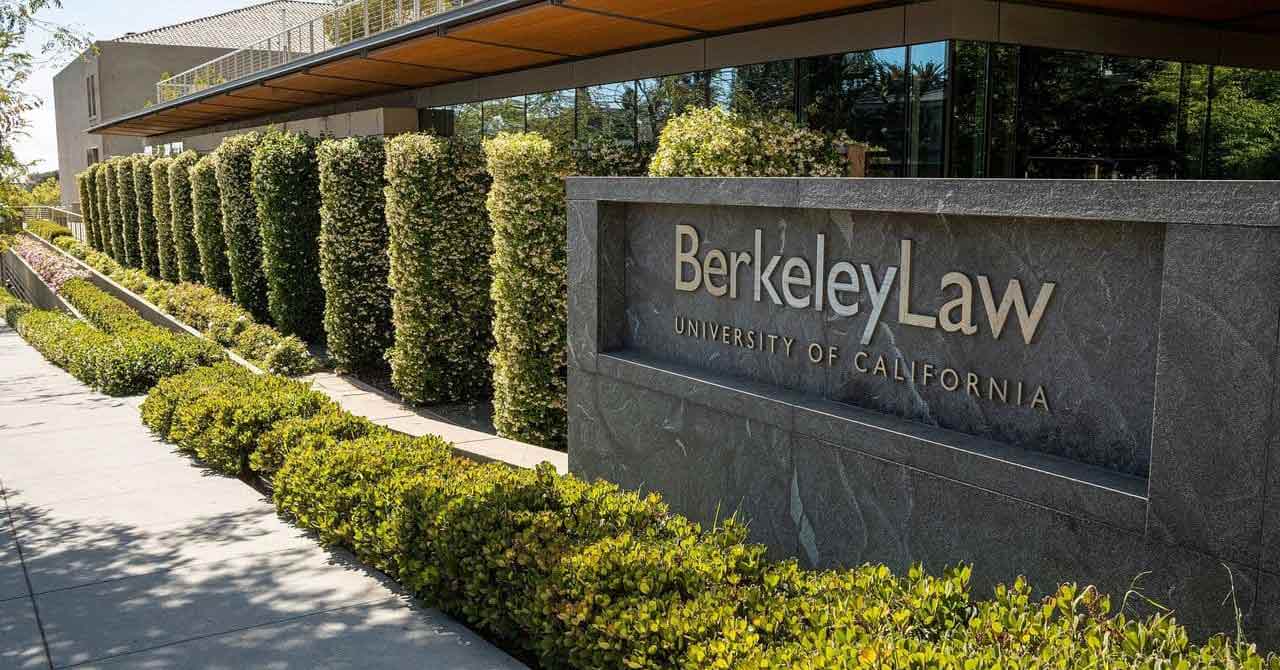
The University of California, Berkeley School of Law, founded in 1894, is located in Berkeley, California, on the southeastern side of the main UC Berkeley campus. The law school is one of the nation’s top public law schools with a longstanding reputation for excellence. Berkeley Law is highly competitive, with an acceptance rate of around 14.9%. The UC Berkeley law acceptance rate highlights how competitive admission to the prestigious institution is. The school’s selective nature is due to the interdisciplinary approach and a strong emphasis on public interest and diversity. Berkeley Law is ranked #10 among law schools in the U.S. in the 2024 U.S. News & World Report. The law school is ranked #1 for intellectual property law, #3 for environmental law, and #4 for corporate law. Berkeley Law is fully accredited by the American Bar Association (ABA), ensuring the law school meets the highest standards for legal education.
Applicants must meet several requirements to apply to the University of California, Berkeley School of Law. The median LSAT score is 170, with a 25th to 75th percentile range of 168 to 173. The median GPA is 3.87, with successful applicants generally falling between 3.77 and 3.97. The application requires a personal statement, resume, letters of recommendation, and optional essays, such as a diversity statement or a “Why Berkeley” essay. Berkeley Law has a Bar exam passage rate of 93.35% for first-time takers, which is significantly higher than the average rate for California law schools, which stands at 74.41%. The high success rate reflects the school’s strong preparation for the legal profession.
The University of California, Berkeley School of Law offers a variety of prestigious law degrees, including the Juris Doctor (J.D.), Master of Laws (LL.M.), Doctor of Juridical Science (J.S.D.), and a Ph.D. in Jurisprudence and Social Policy (JSP). The J.D. program provides a comprehensive legal education, while the LL.M. program allows international and U.S. law students to specialize in areas of their choice. The J.S.D. is a research-focused degree aimed at lawyers pursuing academic careers, and the Ph.D. in JSP is interdisciplinary, combining law with social sciences.
Berkeley Law offers a wide range of specializations, including intellectual property law, environmental law, business law, criminal justice, and international law. The specializations allow students to concentrate on their studies and earn certificates in their chosen fields. The tuition fees for the 2024-2025 academic year are $62,567 for California residents and $74,995 for non-residents. The total cost of attendance rises to about $111,829 for non-residents when factoring in living expenses.
6. Wake Forest Law School
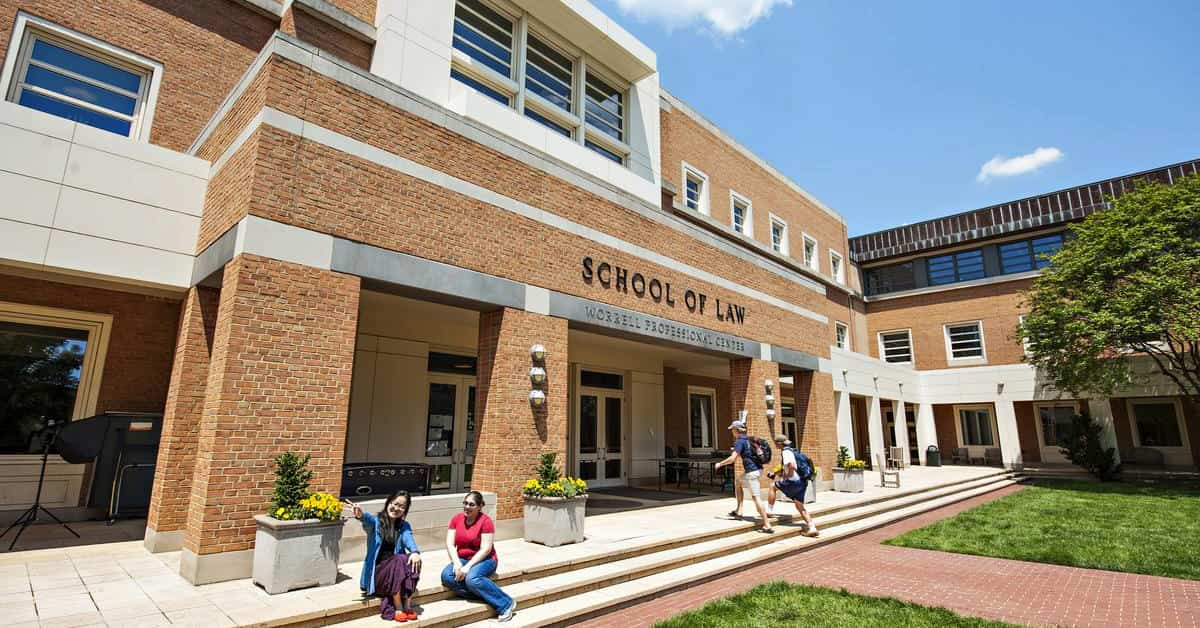
Wake Forest University School of Law, founded in 1894, stands in Winston-Salem, North Carolina. ABA accreditation, granted in 1936, confirms adherence to the high standards of legal education in the United States. The 31.47% acceptance rate highlights the school’s selectivity. A rigorous curriculum, focus on professional preparedness, and strong career outcomes create significant challenges for admission. U.S. News & World Report ranks Wake Forest Law at #32 in 2024, placing the institution among top-tier law schools. The legal writing program, ranked #12, showcases excellence in specialized areas of legal education.
Applicants must meet high academic standards for admission to Wake Forest Law School in 2024. The median LSAT score is 165, and the median GPA is 3.79. The 25th to 75th percentile ranges are 160–166 for the LSAT and 3.64–3.88 for the GPA. Wake Forest accepts GRE scores as an alternative to the LSAT, providing more flexibility for applicants. Applicants must submit letters of recommendation, a personal statement, and a resume in addition to standardized test scores and GPA. The personal statement allows applicants to highlight their motivations, experiences, and unique perspectives. Optional addendums are submitted to explain any discrepancies in scores or grades. Wake Forest Law boasts an impressive Bar exam passage rate of 89.84%, surpassing the North Carolina average of 69% and the national average. The rate demonstrates the school’s strong focus on preparing students for legal practice, making it a highly regarded institution for legal education.
Wake Forest University School of Law offers several law degrees, including the Juris Doctor (J.D.), Master of Laws (LL.M.), and Doctor of Juridical Science (S.J.D.). The J.D. is a comprehensive program for students aiming to practice law, while the LL.M. is designed for foreign-trained lawyers who want to specialize in U.S. law. The S.J.D. is a research-intensive degree for lawyers pursuing academic or scholarly careers. The school offers a Master of Studies in Law (MSL) for professionals seeking legal knowledge without becoming attorneys. Wake Forest Law provides specialization options in business law, criminal law, intellectual property law, technology law, international law, and environmental law. Students choose to focus on one of the areas or create a custom path that aligns with their career goals.
The tuition fee for the 2024-2025 academic year is approximately $55,162 for the J.D. program, with total estimated costs, including living expenses, reaching around $88,731 annually. Scholarships are widely available, with many students receiving financial aid.
7. Duke University School Of Law

Duke University School of Law, founded in 1868, stands in Durham, North Carolina. The institution became Duke Law after the university’s renaming in 1924, having originally been established as the law department of Trinity College. Duke Law admits only 10.51% of applicants, ranking among the most competitive law schools in the country. The school’s prestigious reputation and selective admissions process create significant challenges for applicants. Duke Law graduates consistently secure top positions in private and public sectors, reflecting the school’s commitment to excellence. U.S. News & World Report ranks Duke Law #5 among law schools in 2024. ABA accreditation further ensures compliance with the highest standards of legal education. The consistently high rankings and competitive environment contribute to Duke Law’s status as one of the most difficult law schools to enter.
Applicants are required to submit an LSAT score or GRE score for admission to Duke University School of Law in 2024. The Duke Law School average LSAT score for admitted students is 170, with scores ranging from 168 to 172 for the 25th and 75th percentiles.
The median GPA is 3.87, with a range from 3.78 to 3.96. Applicants must submit a personal statement, resume, and two to four letters of recommendation. The personal statement allows applicants to highlight their motivations and experiences beyond academic performance.
Duke Law has a Bar exam passage rate of 94.44%, which is higher than the national average and significantly above the North Carolina state average of 77%. The strong Bar passage rate reflects the school’s rigorous academic training and preparation for legal practice.
Duke University School of Law offers several advanced law degrees, including the Juris Doctor (J.D.), Master of Laws (LL.M.), Doctor of Juridical Science (S.J.D.), and joint degree programs like the J.D./MBA or J.D./LL.M. The J.D. is the primary program, designed to prepare students for various legal careers, while the LL.M. is a one-year program for international students or U.S. graduates wanting specialized legal training. The S.J.D. is a research-intensive degree aimed at students pursuing academic careers.
Duke Law offers diverse specializations in corporate and financial law, constitutional law, environmental law, health law, international law, and technology law. Students gain practical experience in the fields by participating in various clinics and research centers. The tuition for the J.D. program for the 2024-2025 academic year is $77,100, with total estimated costs, including living expenses, reaching $109,398. 94.96% of students receive some form of grant or scholarship, with an average grant of $30,000.
8. Boston College Law School
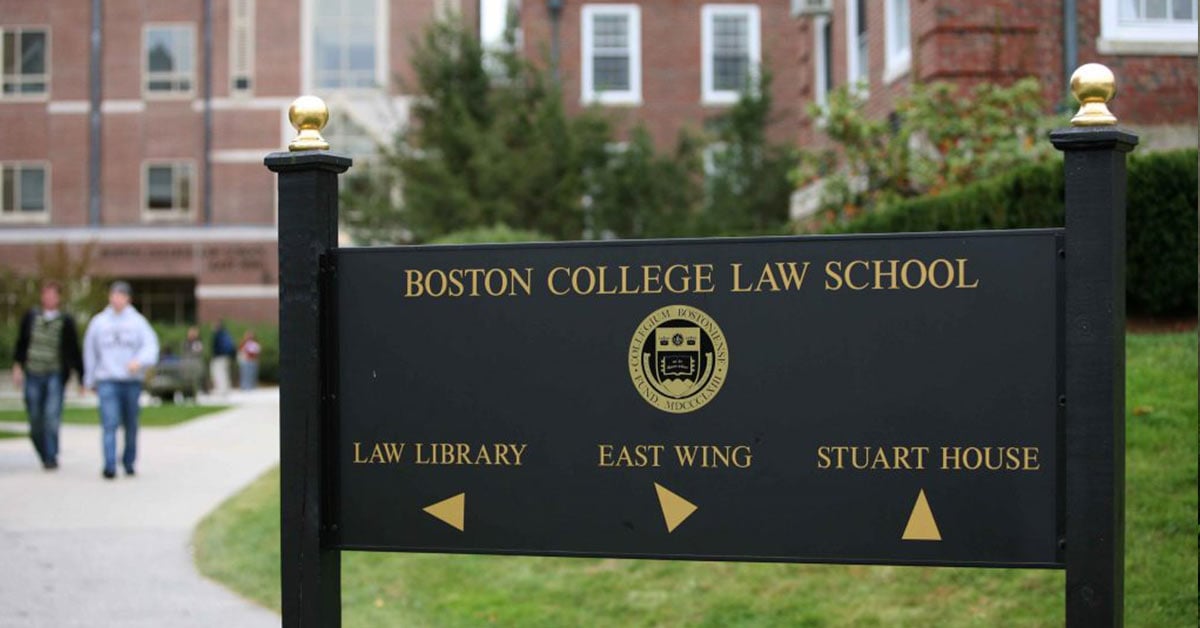
Boston College Law School, founded in 1929, is located in Newton, Massachusetts, on a 40-acre campus just outside of downtown Boston. The law school has a strong reputation for blending high academic expectations with a commitment to social justice, which aligns with its Jesuit tradition. BC Law is highly selective, with an acceptance rate of 13.38%. The law school attracts top-tier candidates, making the institution competitive for admission. The school’s emphasis on cultivating graduates who perform well academically and contribute to public service elevates the institution’s standing. BC Law is ranked #29 in the 2024 U.S. News & World Report. The law school has strong rankings in specialty areas, including #16 in tax law. Boston College Law School is ABA-accredited, ensuring that the institution meets rigorous academic and professional standards.
Applicants must meet stringent academic standards for admission to Boston College Law School. The median LSAT score is 167, and the median GPA is 3.77, reflecting the program’s competitive nature. Students generally fall within the 25th to 75th percentile range of LSAT scores from 161 to 168 and GPAs from 3.59 to 3.85. Applicants must submit a personal statement, letters of recommendation, and a resume detailing leadership roles, professional experience, and extracurricular activities. The non-academic factors are crucial in Boston College Law’s holistic review process. The law school boasts a 95.88% Bar exam passage rate for first-time test takers, significantly above the national average of 77.2%.
Boston College Law School offers a range of law degrees, including the Juris Doctor (J.D.), Master of Laws (LL.M.), and dual degree programs such as the J.D./M.B.A. and J.D./M.Ed. The J.D. is the primary program, providing a foundation in legal education with opportunities for specialization. The LL.M. is tailored for international lawyers or U.S. graduates seeking expertise in specific areas. BC Law provides specializations in business law, environmental law, international law, and tax law. Students benefit from various clinical programs, such as civil litigation and criminal justice, which provide hands-on experience. The tuition fee for the 2024 academic year is approximately $66,895, with additional living expenses bringing the total estimated cost to around $90,698. Financial aid is widely available, with around 97% of students receiving some form of aid and the average grant amount being $21,000.
9. University Of Chicago Law School
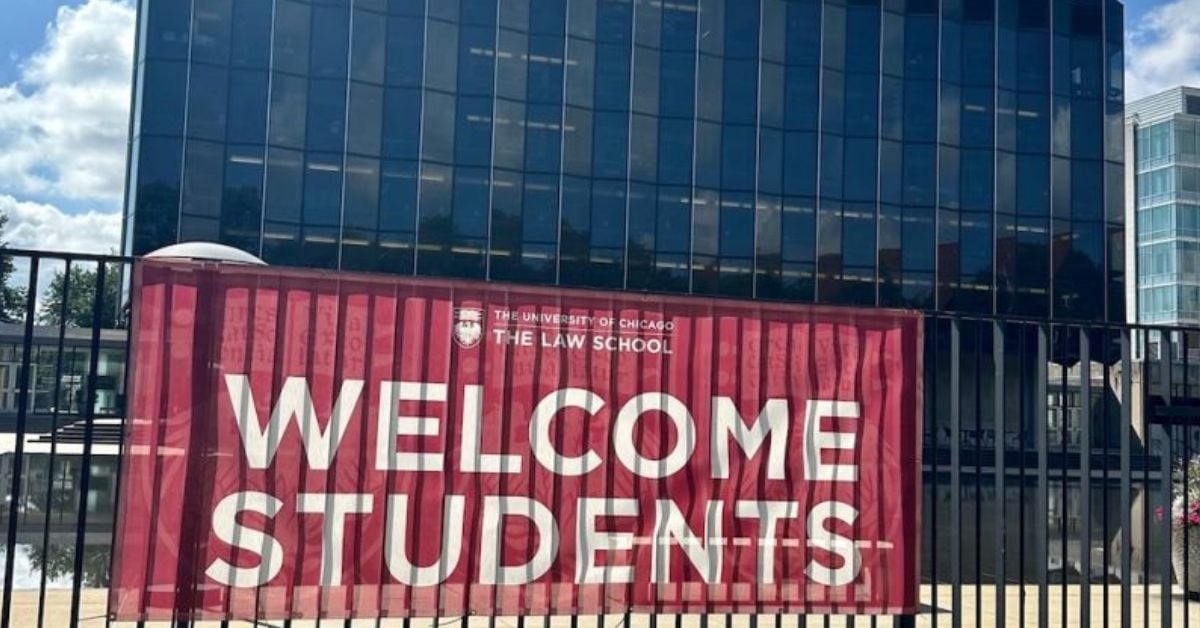
The University of Chicago Law School was founded in 1902 and quickly gained a reputation for academic rigor. The law school developed strong interdisciplinary connections, particularly with economics and political science. The institution resides in Chicago, Illinois, within the prestigious University of Chicago. The law school remains one of the most selective in the country, with an acceptance rate of around 12%, admitting only the most qualified students. The selection process considers a variety of factors, including leadership and professional achievements, making admission highly competitive. The school is consistently ranked #3 among U.S. law schools by U.S. News & World Report, solidifying its standing as one of the nation’s elite programs. The law school is fully accredited by the American Bar Association, ensuring graduates are well-prepared for success.
Applicants must submit an LSAT score for admission to the University of Chicago Law School. The LSAT scores range from 169 to 175, with a median of 173. The GPA range is similarly competitive, with a median of 3.94 and most students falling between 3.83 and 3.99. The statistics reflect the highly selective nature of the school. Other requirements include a personal statement, a resume detailing academic and professional experiences, and letters of recommendation (usually two to four). Applicants must submit either an LSAT or GRE score. International students must demonstrate English proficiency through the TOEFL or IELTS unless waived. Applicants must provide official transcripts from all undergraduate institutions. Applicants use the UChicago Law Status Checker to monitor the progress of their law school application after submission. The checker updates whether the application is received, incomplete, or under review by the admissions committee. The University of Chicago Law School boasts a high Bar exam passage rate of 97.1%, reflecting the school’s rigorous preparation for legal practice.
The University of Chicago Law School offers law degrees, including JD, LLM, and JSD. The JD serves as the primary degree for legal practice, while the LLM caters to international students or lawyers seeking specialized knowledge of U.S. law. The JSD focuses on research and is ideal for lawyers pursuing academic careers. Students specialize in constitutional law, criminal justice, law and economics, environmental law, and international law through clinics and coursework. Programs like the Civil Rights and Police Accountability Project and the Supreme Court Litigation Clinic provide practical legal experience. Tuition for JD and LLM programs in 2024 is $77,877, with the total cost of attendance, including living expenses, at $106,225. Financial aid is available, with 83.11% of students receiving grants or scholarships, averaging $15,000.
10. Northwestern Pritzker School Of Law
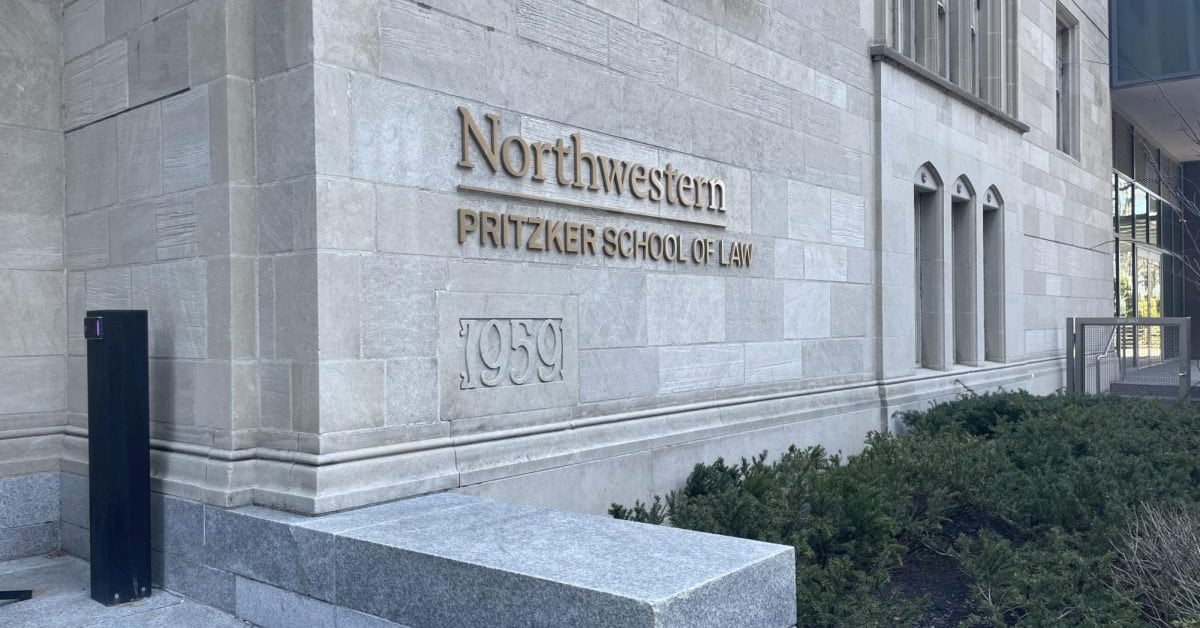
Northwestern Pritzker School of Law, established in 1859, is the oldest law school in Chicago, originally founded by Henry Booth. The law school is situated in downtown Chicago, offering students access to nearby legal institutions and firms for practical opportunities. The school is highly competitive, with an acceptance rate of approximately 15.5%, reflecting its rigorous standards and emphasis on work experience. Northwestern Law ranks #9 among U.S. law schools according to U.S. News & World Report. 90% of students have at least one year of full-time work experience, contributing to the program’s selectivity. The law school, accredited by the American Bar Association, maintains the highest legal education standards.
The average LSAT score required for admission to Northwestern Pritzker School of Law in 2024 is 172, with the middle 50% of scores ranging from 166 to 174. The average undergraduate GPA is 3.92, with admitted students generally falling between a GPA range of 3.66 and 3.97. Applicants must submit a personal statement, résumé, LSAT or GRE scores, letters of recommendation, and transcripts as part of their application. The school boasts a high Bar exam passage rate of 92.89%, significantly above the Illinois average of 76.19%. The law school’s rigorous academic standards and competitive admissions process make the institution one of the top law schools in the country.
Northwestern Pritzker School of Law offers a variety of law degrees catering to diverse student needs. The primary degrees include the Juris Doctor (JD), JD-MBA, JD-PhD, and JD-LLM programs. Specialized LLM degrees, such as LLM in Taxation and LLM in International Human Rights, provide advanced study opportunities for legal professionals. A Master of Science in Law (MSL) program is designed for professionals who seek legal knowledge without becoming lawyers. Specializations at Northwestern Pritzker include business law, public interest law, technology and intellectual property, and international law, among others. The school emphasizes interdisciplinary learning and offers various clinics, such as the Bluhm Legal Clinic, where students gain hands-on experience. The tuition for the JD program is $74,552 annually, while the JD-MBA program costs around $108,606 per year. The total cost of attendance is about $99,872 annually, including living expenses. Financial aid is available, with over 69% of students receiving scholarships or grants.
11. University Of Pennsylvania Carey Law School
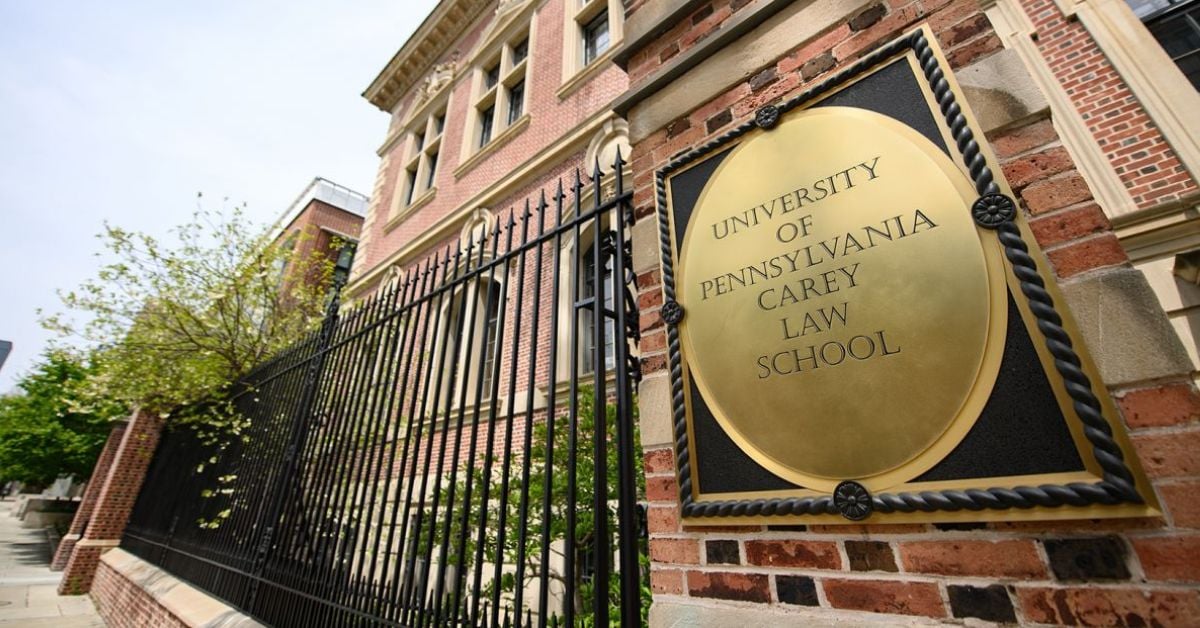
The University of Pennsylvania Carey Law School, founded in 1850, is one of the oldest and most prestigious law schools in the U.S. The law school’s history includes several firsts, including being the first law school to admit women and African Americans in Pennsylvania. The school is located in Philadelphia, Pennsylvania, and its downtown location provides excellent access to courts and law firms. Penn Carey Law is one of the most competitive law schools in the country, with an acceptance rate of just 9.7%. The selection process is highly rigorous, considering applicants’ leadership, life experiences, and academic achievements. Penn Carey Law is ranked #4 in the 2024 U.S. News & World Report rankings, sharing the position with top institutions like Duke and Harvard. The American Bar Association (ABA) accredited the law school, ensuring that the legal programs meet high educational standards.
Applicants generally need a median LSAT score of 172 and a median GPA of 3.92 for admission to the University of Pennsylvania Carey Law School in 2024. The UPenn average LSAT scores for the middle 50% of admitted students range from 168 to 174, while GPA ranges from 3.66 to 3.98. Additional application requirements include submitting a personal statement, letters of recommendation, and official transcripts. The Bar exam passage rate for Penn Carey Law graduates is notably high, with a rate of 96.25% for first-time takers, well above the national average. The rate underscores the rigorous academic preparation students receive at law school, which helps them succeed in their legal careers.
The University of Pennsylvania Carey Law School offers a diverse array of law degrees, including the Juris Doctor (JD) and Master of Laws (LLM). The law school provides specialized programs such as the Master in Comparative Law (LLCM), Doctor of Juridical Science (SJD), and Master in Law (ML). The school is renowned for its cross-disciplinary focus, allowing students to pursue joint degrees such as the JD/MBA with Wharton or the JD/PhD in fields like history, psychology, or philosophy. Other available specializations include law and technology, international law, business law, and public interest law. Penn Carey Law offers certificate programs in areas like Gender and Sexuality Studies, Global Human Rights, and Environmental Policy. The tuition fee for full-time JD students in the 2024 academic year is approximately $76,934. Total living costs are estimated at around $28,998, bringing the total annual cost of attendance to over $105,000. 53.6% of students receive scholarships or grants, averaging $40,000 in financial aid.
12. University Of Texas At Austin School Of Law
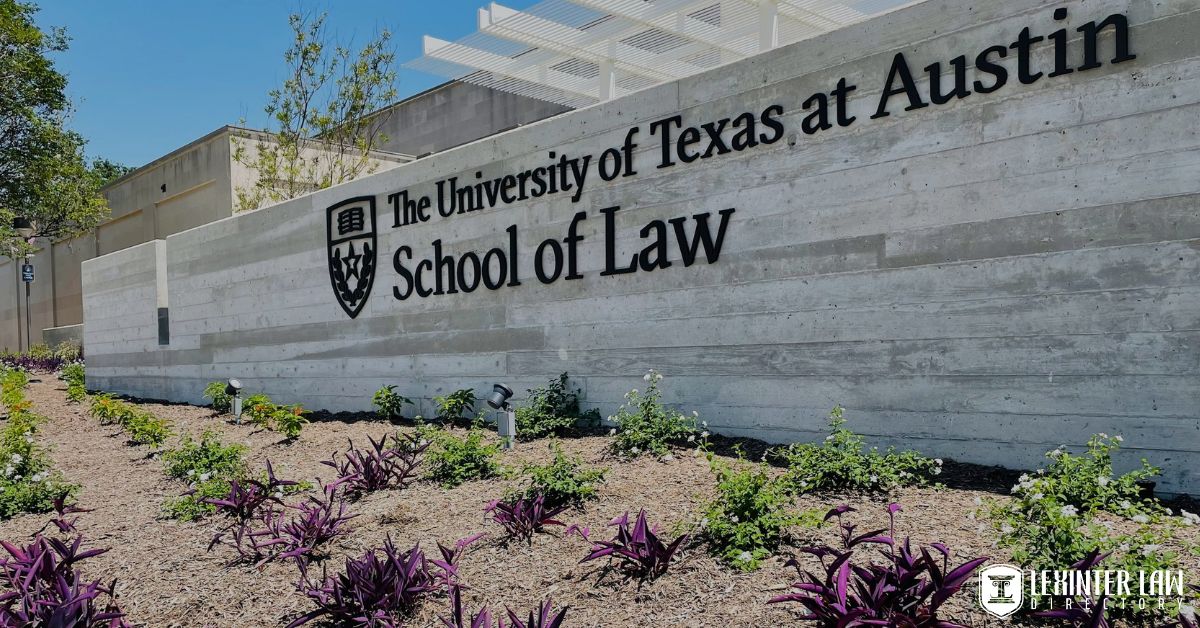
The University of Texas at Austin School of Law, founded in 1883, is one of the oldest and most prestigious law schools in the United States. The law school is located in the vibrant city of Austin, Texas, offering students access to numerous legal, political, and cultural opportunities. Texas Law is highly selective, with an acceptance rate of about 14.9%. The law school’s rigorous academic environment and strong focus on practical legal training make the institution a competitive law school. Admission is particularly challenging because the institution is a top public law school, with many students applying from across the U.S. Texas Law, ranked #16 by U.S. News & World Report for 2024, is consistently among the top 20 law schools nationally. The American Bar Association (ABA) fully accredited the school, ensuring its programs meet high educational standards.
The median LSAT score required for the 2024 admissions cycle at the University of Texas at Austin School of Law is 171, and the median GPA is 3.86. Admitted students fall within an LSAT range of 166 to 172 and a GPA range of 3.72 to 3.96. Applicants must submit a personal statement, résumé, transcripts, and letters of recommendation. Texas Law accepts either the LSAT or GRE for standardized test submissions, allowing applicants to choose which score to submit. Other application requirements include registering with the Credential Assembly Service (CAS) and completing an LSAT Writing Sample. The school offers an Early Decision (ED) option for applicants who are certain Texas Law is their top choice, with a binding commitment upon acceptance. The Bar exam passage rate for the school is notably high, with a success rate of 94.01%, reflecting the rigorous preparation students receive.
The University of Texas at Austin School of Law offers various law degrees, including the Juris Doctor (JD), Master of Laws (LLM), and dual degree programs such as the JD/MBA and JD/PhD. The JD is a three-year program focusing on core legal subjects like constitutional law, contracts, and civil procedure. The LLM is tailored for foreign-trained lawyers and lawyers seeking further specialization. Texas Law offers specializations in business law, environmental law, human rights law, and energy law. Students gain practical legal experience through clinics in immigration, civil rights, and criminal defense. International study opportunities are available through exchange programs. The tuition fee for the 2024 academic year is approximately $36,429 for Texas residents and $54,096 for out-of-state students. The total cost of attendance, including living expenses, is about $63,410 for Texas residents and $81,996 for non-residents. Financial aid and scholarships are available to help offset the costs.
13. University Of Michigan Law School
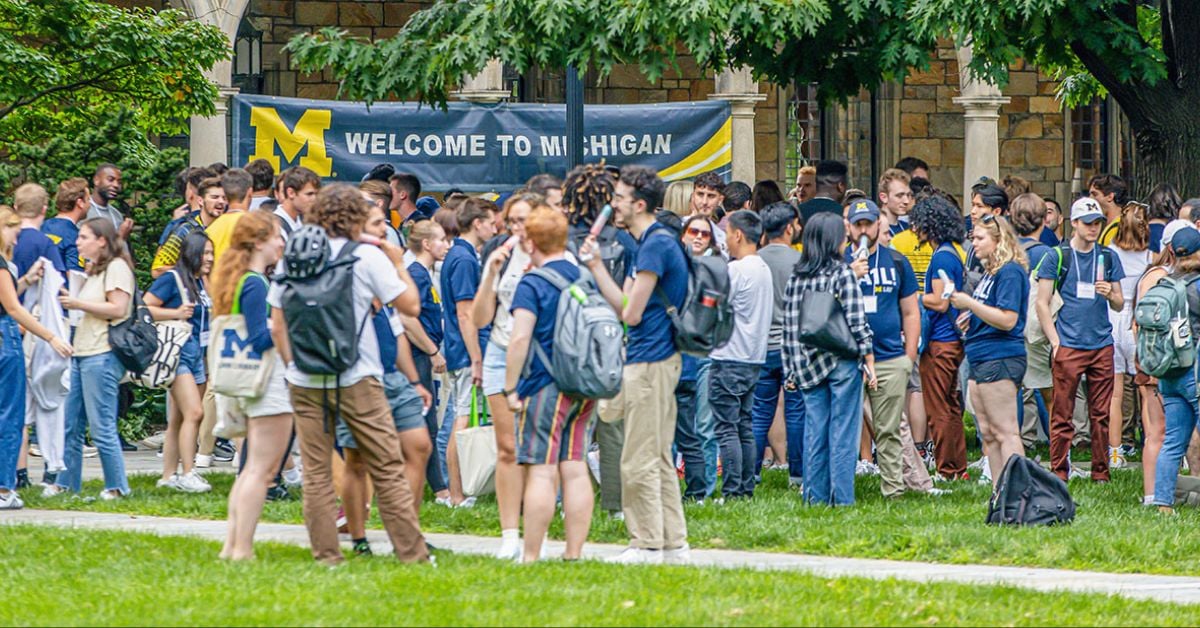
The University of Michigan Law School, founded in 1859, is one of the oldest and most prestigious law schools in the United States. The law school is located in Ann Arbor, Michigan, and its historic Cook Law Quadrangle is an architectural highlight that serves as the center of the campus. Michigan Law is highly selective, with an acceptance rate of 12.58%, admitting students with diverse backgrounds and strong academic records. The competitive admissions process reflects the school’s status as one of the top-ranked law schools. Michigan Law, ranked #10 by U.S. News & World Report for 2024, consistently ranks among the top 10 law schools nationally. Gaining admission to the law school is particularly challenging due to the prestigious programs and the success of alumni in securing top legal positions. The University of Michigan Law School is accredited by the American Bar Association (ABA), ensuring the institution meets the highest standards of legal education.
The median LSAT score for admitted students in the 2024 admissions cycle at the University of Michigan Law School is 171, with a median GPA of 3.85. The LSAT scores for the middle 50% of admitted students range from 166 to 172, and the GPA range is 3.64 to 3.92. The Michigan Law medians showcase the competitiveness of the applicant pool. Applicants must submit a personal statement, résumé, letters of recommendation, and transcripts by the application deadline. Applicants are required to submit a Credential Assembly Service (CAS) report, which compiles LSAT scores, GPA, writing samples, and recommendations. Michigan Law accepts GRE scores, while the LSAT is the preferred test. The Bar exam passage rate for University of Michigan Law graduates is exceptionally high at 97.27%, highlighting the school’s rigorous academic standards and reputation as one of the top law schools in the country.
The University of Michigan Law School offers several degree programs, including the Juris Doctor (JD), Master of Laws (LLM), and Doctor of Juridical Science (SJD), each designed to prepare students for various areas of legal practice and scholarship. The JD program combines foundational legal education with doctrinal and experiential learning opportunities. Dual degrees, such as the JD/MBA and JD/Master of Public Policy, allow students to integrate legal studies with other fields. Michigan Law provides specializations in areas like international and comparative law, intellectual property law, tax law, and environmental law. Students engage in experiential learning through clinics, externships, and simulations, gaining practical legal experience. The tuition for the 2024 academic year is approximately $69,584 for Michigan residents and $72,584 for out-of-state students. Living expenses are estimated at $24,144, bringing the total cost of attendance to about $93,948 for residents and $96,984 for non-residents. Financial aid, including scholarships and grants, is available to help students manage their education costs.
14. University Of Virginia School Of Law

The University of Virginia School of Law, founded in 1819 by Thomas Jefferson, is the second-oldest continuously operating law school in the U.S. The law school is located in Charlottesville, Virginia, and is known for its strong tradition of public service and leadership in legal education. UVA Law offers a dynamic legal education grounded in a cooperative and intellectually vibrant community. UVA Law is highly selective, with an acceptance rate of 11.46%, admitting only top-tier candidates who demonstrate exceptional academic and professional potential. Admission is challenging due to the rigorous programs and the success of its graduates in securing prestigious legal roles. UVA Law consistently places among the top law schools in the U.S., ranked #4 by U.S. News & World Report in 2024. The school is accredited by the American Bar Association (ABA).
Applicants for 2024 admissions to the University of Virginia School of Law need an LSAT score ranging from 166 to 173, with a median of 171.
The median GPA for admitted students is 3.94, with the middle 50% of GPAs falling between 3.72 and 3.99. Applicants must submit a personal statement, résumé, at least two letters of recommendation (up to four), transcripts, and an application fee. UVA accepts GRE and GMAT scores as alternatives to the LSAT. The Bar exam passage rate for first-time takers from UVA Law is a high 96.5%, significantly above the Virginia state average of 79.39%, demonstrating the school’s strong academic preparation. UVA Law uses a holistic review process, considering multiple aspects of an applicant’s background and experience.
The University of Virginia School of Law offers several degrees, including the Juris Doctor (JD), Master of Laws (LLM), and Doctor of Juridical Science (SJD). The JD program is the school’s flagship, preparing students for a wide range of legal careers, while the LLM and SJD programs cater to lawyers interested in advanced or international legal studies. Dual degree programs, like the JD/MBA and JD/MPP (Master of Public Policy), allow students to combine legal education with other fields. UVA Law’s specializations include business law, criminal justice, environmental law, international law, and human rights. Students gain practical experience by participating in various clinical programs, such as Appellate Litigation, Environmental Law, and Criminal Defense. The 2024 academic year tuition is $74,700 for Virginia residents, while out-of-state students pay $77,700. The total cost of attendance, including living expenses and other costs, is around $105,870. Financial aid is available, with approximately 66.26% of students receiving grants averaging $30,000.
15. The University Of Southern California Gould School Of Law
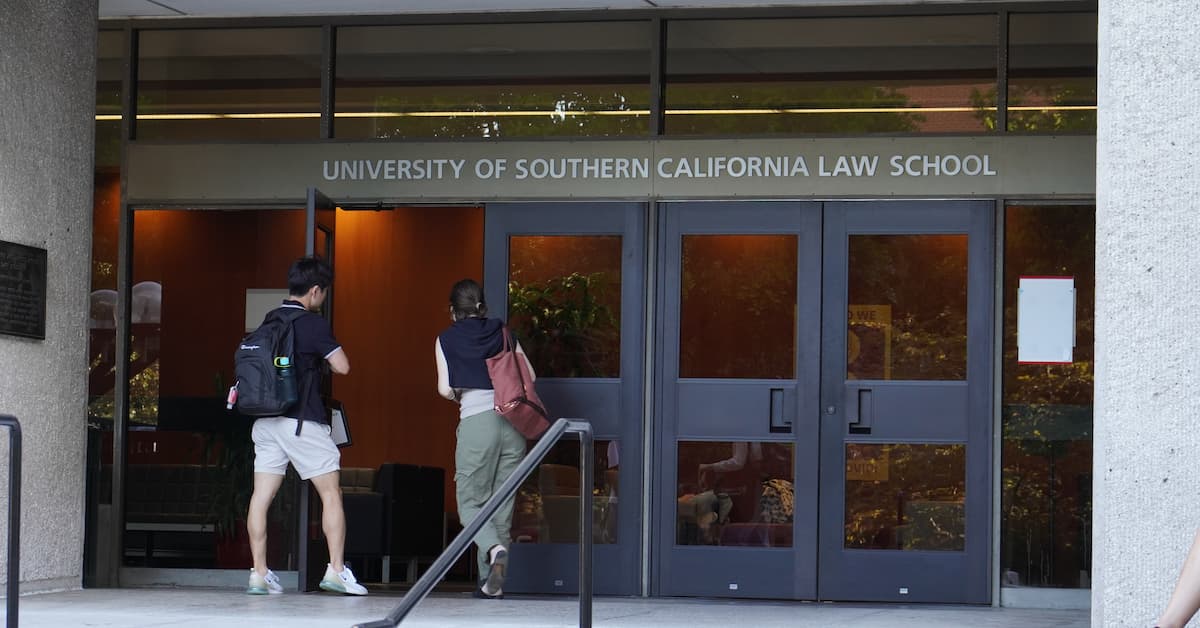
The University of Southern California Gould School of Law began operations in 1896. The law school resides in Los Angeles, California, offering access to key legal and entertainment hubs. The USC Gould acceptance rate stands at 12.5%, reflecting its selectivity. USC Gould ranks 20th, according to the 2024 U.S. News & World Report. Admission is highly competitive, with applicants needing strong academic and leadership credentials. The school prioritizes well-rounded candidates who demonstrate a commitment to public service and leadership potential. USC Gould has been accredited by the American Bar Association (ABA) since 1924, ensuring the programs meet rigorous educational standards. The law school’s challenging admissions process and prestigious programs make the institution one of the top destinations for legal education in the country. Graduates frequently secure prominent legal positions in various industries, especially in Los Angeles.
The 2024 admissions process at USC Gould School of Law requires an LSAT score with a median of 169. Applicants need a median GPA of 3.88, demonstrating a strong academic record. Applicants must submit transcripts, letters of recommendation, a résumé, and a personal statement detailing their motivations for pursuing law. The admissions process is highly competitive, considering all applicants’ academic and leadership potential. USC Gould has an 82.42% Bar exam passage rate, reflecting the law school’s strong academic preparation. The curriculum emphasizes real-world experiences through clinics and externships, preparing students for the legal profession.
The University of Southern California Gould School of Law offers various law degrees, including the Juris Doctor (JD) and Master of Laws (LLM). Students pursue a Master of Studies in Law (MSL) or specialized programs such as the LLM in privacy law and cybersecurity. The law school provides students with diverse specializations, including constitutional law, business law, public interest law, and entertainment law. The programs are designed to equip students with in-depth knowledge in specific legal areas. Tuition for the 2024 academic year is $78,038 for JD and LLM students, with additional costs for living expenses. The total cost of attendance, including living expenses, is approximately $108,000. Students receive financial aid, with nearly 97% of students benefiting from scholarships or grants. Financial aid helps cover over half of the tuition, significantly reducing student expenses. The law school’s rigorous academic offerings and financial support make it a leading choice for aspiring lawyers.
How To Choose Which Hardest Law School To Apply For?
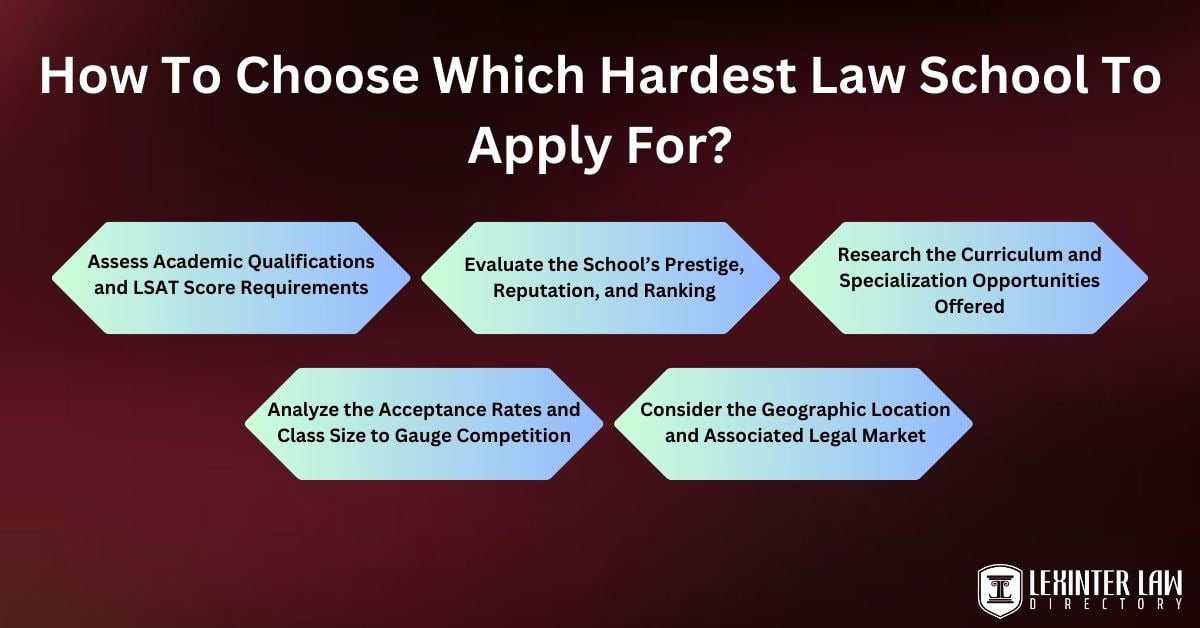
To choose which hardest law school to apply for follow the five steps listed below.
- Assess Academic Qualifications and LSAT Score Requirements. Top law schools set high standards for admissions, requiring competitive GPAs and LSAT scores. Evaluating an academic record against the average acceptance criteria for each school is essential. The LSAT is a key factor, with top-ranked institutions expecting scores in the 170s range. Understanding where qualifications align helps narrow down the hardest law schools where a realistic chance exists.
- Evaluate the School’s Prestige, Reputation, and Ranking. Prestige and reputation play a significant role when selecting a challenging law school. Researching rankings published by reputable sources, such as U.S. News & World Report, is helpful. Top-tier schools have rigorous admission processes and are highly selective. Alumni success, faculty achievements, and job placement statistics provide insight into whether a law school offers the competitive edge required for career goals.
- Research the Curriculum and Specialization Opportunities Offered. Top law schools offer rigorous and specialized legal programs. Investigating the curriculum to see if it matches personal interests and career aspirations is crucial. Specialized programs in areas such as constitutional law, international law, or corporate law indicate the school’s academic intensity. Schools with renowned programs in a particular field offer greater academic challenges and more career opportunities.
- Analyze the Acceptance Rates and Class Size to Gauge Competition. High competition for limited spots makes certain law schools harder to get into. Examining the school’s acceptance rate, which is as low as 10%, and considering the average class size is essential. Schools with lower acceptance rates and smaller classes are generally more selective, demanding stronger applications. Evaluating the competitive factors aids in determining the chances of securing admission.
- Consider the Geographic Location and Associated Legal Market. Law schools located in major cities or near judicial hubs have ties to influential legal markets. Factoring in the location is important, as proximity to courts and large firms significantly impacts internships and job opportunities. Attending a law school in a competitive legal market is a key factor to consider due to increased academic and professional challenges.
What Are The Requirements For Applying To Law School?
The requirements for applying to law school include a Bachelor’s degree, LSAT or GRE scores, a personal statement, letters of recommendation, and a résumé. Schools value strong academic performance, professional experiences, and clear writing that demonstrates motivation and leadership potential. A Bachelor’s degree from an accredited institution is a basic requirement for admission to law school. Law schools recommend pursuing degrees in political science, economics, or history, but any major is generally accepted. A strong academic record helps demonstrate the applicant’s ability to handle rigorous coursework. Law schools evaluate undergraduate grades and overall academic performance critically during the admissions process. Law school applicants are required to submit scores from the Law School Admission Test (LSAT) or the Graduate Record Examinations (GRE). The LSAT measures skills in reading comprehension, analytical reasoning, and logical thinking. Several law schools have begun accepting GRE scores, offering a more flexible option for applicants. Prestigious schools like Harvard Law School, Stanford Law School, and Columbia Law School have adopted the option, offering greater flexibility for applicants.
A well-written personal statement is required to provide insight into an applicant’s motivations and goals. Admissions committees look for clarity of purpose, writing ability, and a unique perspective. The document helps the admissions team understand an applicant’s personality and potential contributions to the academic environment. The personal statement plays a crucial role in making an applicant stand out among others. Requirements for applying in law school include strong letters of recommendation from professors, employers, or professionals familiar with their academic or professional capabilities. The letters provide additional evidence of work ethic, critical thinking, and leadership potential. Law schools seek letters that offer detailed examples of an applicant’s achievements and character, helping to paint a well-rounded picture of their qualifications. A résumé or CV highlighting professional experience, internships, volunteer work, and academic achievements is required for submission. The document gives law schools a broader view of the applicant’s experiences outside the classroom. Professional experiences that demonstrate leadership, legal-related skills, or community involvement enhance an applicant’s profile. Law schools appreciate applicants who showcase a diverse and well-rounded background. ABA-accredited law schools require applicants to register with the Credential Assembly Service (CAS). The service simplifies the application process by compiling transcripts, letters of recommendation, and standardized test scores into a comprehensive report. Law schools receive a unified document, ensuring consistency and efficiency in application evaluations. The CAS saves applicants the time of sending individual documents to each school, streamlining the process for the applicant and the admissions committees.
Do All Law Schools Have The Exact Requirements?
No, not all law schools have the exact requirements. Law schools vary in application requirements, and no uniform standard applies to all institutions. Law schools do require core components like the LSAT or GRE, transcripts, and letters of recommendation. Additional elements, however, differ depending on each school. Several schools ask for a personal statement that covers specific themes or explanations, while others allow for optional essays discussing background, leadership experience, or challenges faced. Certain schools accept LSAT or GRE scores, while some prefer only one test for specific applicants. International students generally must demonstrate English proficiency through tests like TOEFL or IELTS. Variations extend to resume formats, the number of recommendation letters required, and whether schools encourage optional submissions to explain any weak points in the application. The differences highlight the importance of researching each school’s criteria carefully before applying, as requirements are highly specific. Applicants must review each law school’s website to ensure compliance with unique procedures and deadlines. Thorough preparation increases the chances of acceptance into law programs, allowing candidates to meet the general and specific expectations required for admission.
What Is The Average GPA For Law Schools?
The average GPA for law schools across all ABA-accredited institutions in 2024 ranges from 3.5 to 3.7. Law schools within the top 20 in the United States generally require a higher GPA, averaging around 3.86. Aspiring students targeting elite programs such as Harvard or Stanford generally need to meet even higher expectations, with median GPAs nearing 3.9. Less competitive law schools conversely accept students with GPAs around 3.0 or slightly lower, though admission remains challenging for individuals with GPAs under 3.2. Law school admissions weigh heavily on the LSAT score, and a strong score sometimes offsets a lower GPA. Admission committees look for well-rounded candidates who excel academically and in other areas. Law schools consider other factors beyond GPA, such as LSAT scores. High GPA applicants must perform well on the standardized test for the best chances of admission. The combination of a strong GPA and a competitive LSAT score boosts the overall profile of the applicant. Prestigious law schools value extracurricular activities and relevant work experience in their decision-making process.
What Is The Average LSAT Score To Get Into Prestigious?
The average LSAT score to gain admission into prestigious law schools generally ranges from 170 to 175. The average LSAT score required for admission to Harvard Law School is 174, ranging between 170 and 176. Stanford Law School has a median LSAT score of 173, while Yale Law School leads with a median of 175. The top-tier institutions expect high scores, and students usually need to perform at the 75th percentile or higher to remain competitive. Scores within the 172-177 range are common among admitted students at the schools, alongside strong academic records. The average LSAT score for top schools is a critical factor in the admissions process. Admissions committees at elite law schools view the LSAT as a critical component of the application process. A high LSAT score demonstrates strong analytical and reasoning skills necessary for success in law school. The test evaluates reading comprehension, logical reasoning, and analytical reasoning, which are essential for legal studies.
Prestigious and hardest law schools now allow applicants to submit GRE scores instead of LSAT results. Harvard, Yale, Stanford, and the University of Chicago are among the schools that are accepting the alternatives. Stanford Law and the University of Chicago permit either GRE or GMAT for application submission. Applicants choosing the route must submit only one test score to avoid complications. Sending LSAT scores alongside GRE or GMAT results in a reevaluation of the application. Columbia University and the University of Pennsylvania Carey Law School accept GRE scores for law school admissions. The approach encourages a broader applicant pool from diverse academic and professional backgrounds. Schools adopting the option aim to maintain their rigorous admissions standards while offering more flexibility. Submitting alternative scores makes law schools accessible to students who have already taken other graduate-level standardized tests. Admissions committees still require applicants to provide transcripts, personal statements, and other essential materials. All application requirements, aside from test scores, remain central to evaluating each candidate’s potential.
What Are The Benefits Of Getting Into A Highly Competitive Law School?
The seven benefits of getting into a highly competitive law school are listed below.
- Prestige and Reputation: Graduating from a highly competitive law school offers a significant boost to one’s legal career. The institutions have strong historical legacies and are well-known across legal and academic circles. Employers prioritize candidates with prestigious degrees due to the rigorous training involved. A law degree from a competitive school opens doors to elite law firms and organizations. Graduates frequently gain higher starting salaries due to the value of their institution’s reputation.
- Top-Notch Faculty: Competitive law schools attract some of the most distinguished legal minds in the field. Professors have extensive experience practicing law or are leading legal scholars. Students benefit from being taught by experts who have published influential works or argued cases in high courts. The guidance helps students understand complex legal theories and navigate nuanced aspects of law practice. Faculty connections further provide access to legal communities and high-level professional opportunities.
- Networking Opportunities: Attending a top law school offers access to an extensive network of successful alumni and legal professionals. Graduates hold influential positions in law firms, government, and corporate sectors. Regularly organized events allow students to meet and connect with established figures in the legal world. Networking opportunities gained during law school lead to valuable mentorships, partnerships, and high-profile career placements. Relationships built in law school continue to be valuable assets throughout a legal career.
- Advanced Resources: Competitive law schools provide access to state-of-the-art legal resources and research facilities. The libraries have comprehensive collections of legal texts, journals, and archives. Schools offer advanced legal technology, enabling students to conduct research more effectively. Students gain access to specialized legal clinics and simulation programs that mirror real-world legal practices. The resources ensure that students remain at the forefront of legal research and practical application.
- Internship and Job Placements: Graduates from top law schools have greater access to prestigious internships and job placements. Competitive programs maintain partnerships with leading law firms, corporations, and government agencies. Career services departments in the schools actively assist students in securing coveted summer internships. Law firms and employers prefer to recruit from top schools during hiring processes. Job placement success rates are generally higher due to the strong institutional connections and industry reputation.
- Bar Exam Success: Students from highly competitive law schools generally have strong Bar exam pass rates. The rigorous academic curriculum and exam-focused preparation increase the chances of success. Top law schools offer specialized Bar prep courses or workshops that focus on key areas of the exam. Faculty work closely with students to ensure they understand legal principles tested in the bar. Graduates benefit from having studied alongside highly motivated peers, creating a collaborative learning environment.
- Diverse Student Body: Competitive law schools attract a diverse group of students from various backgrounds and regions. The diversity enriches the classroom experience, offering students multiple perspectives on legal issues. Interacting with peers from different socioeconomic, cultural, and international backgrounds fosters a deeper understanding of global legal systems. A diverse student body enhances the learning environment and creates opportunities for collaboration. Graduates leave with a more well-rounded and culturally informed legal outlook.
What Are The Downsides Of Getting Into A Highly Competitive Law School?
The seven downsides of getting into a highly competitive law school are listed below.
- Intense Academic Pressure: Students at highly competitive law schools experience significant academic pressure. Expectations are exceptionally high, and the workload is overwhelming. Professors frequently assign challenging materials that require extensive time and focus. Maintaining a high academic standing is crucial for securing top internships, adding additional stress. The environment sometimes hinders creative thinking due to the focus on performance.
- Work-Life Balance: Balancing personal life with academics becomes challenging at highly competitive law schools. Students must dedicate most of their time to studying, research, and case preparation. The demanding workload leaves little time for relaxation or social activities. Managing relationships, hobbies, or health becomes increasingly difficult as students prioritize academics. Failing to maintain a work-life balance leads to burnout, exhaustion, and even physical or mental health issues. The constant need to prioritize studies creates personal sacrifices.
- Tuition Costs: Attending a top law school generally comes with high tuition fees, leading to financial burdens. Law school tuition, coupled with additional expenses for books, housing, and resources, creates significant debt. Scholarships and financial aid are limited, leaving students reliant on student loans. Graduates face substantial debt upon completing their degrees, creating long-term financial obligations. The high cost of education forces some students to prioritize higher-paying jobs over passion-driven legal careers.
- Financial Stress: Managing finances during law school is a significant source of stress for many students. High tuition costs lead to students taking on substantial loans, adding financial pressure. Along with tuition, living expenses in cities where top law schools are located further burden students. Students need to find part-time jobs to support themselves, adding to their workload. Financial stress impacts mental health and academic performance, compounding challenges throughout the law school journey.
- Class Size: Classes at prestigious law schools have large student enrollments, making individual attention from professors difficult. Students compete for participation in class discussions or limited office hours with faculty. The limitation affects opportunities to build close academic relationships or receive tailored feedback on performance.
- Grade Curves: Competitive law schools implement strict grade curves, creating a challenging academic environment. Grade curves limit the number of students who receive top grades, regardless of overall performance. The system intensifies competition among students as grades impact career opportunities. The pressure to outperform classmates diminishes collaboration and increases stress. Students must constantly work to secure high grades within the constraints, adding to the academic rigor already present.
- Competitive Job Market: Graduates from competitive law schools still face a highly competitive job market, especially for prestigious roles. Law firms have limited positions available for entry-level hires, making the competition fierce even for graduates from top law schools. Employers sometimes prioritize work experience, extracurricular involvement, or specialized skills over academic prestige. Graduates find themselves competing against peers from other top schools with similar qualifications.
Are The Hardest Law Schools To Get Into More Expensive?
Yes, getting into the hardest law schools is more expensive. The hardest law schools to get into, like Harvard, Yale, Stanford, and Columbia, are more expensive due to their prestigious status. Harvard’s tuition for 2024-2025 is around $78,692, making the institution one of the priciest options. Yale’s tuition for 2024-2025 is $76,369, with a total estimated cost of attendance reaching $100,469 when factoring in living expenses. Stanford’s tuition stands at $73,713 for 2024, but total costs, including living expenses, soar to $105,554. Columbia charges the highest, with tuition reaching approximately $81,888 and overall costs nearing $119,997.
The institutions are renowned for their academic excellence and global reputations. The law school’s elite status contributes to higher tuition rates. The top law schools provide access to significant resources, prestigious faculty, and valuable career opportunities. The competitive admissions process further adds to the exclusivity, drawing applicants willing to invest heavily in their legal education. Higher operational costs and the desire to maintain state-of-the-art facilities and services contribute to the elevated prices. Prospective students know that attending the institutions offers a strong return on investment through powerful alumni networks and potential high-paying legal careers. The high cost of attendance reflects the quality of education and opportunities provided by the prestigious law schools.
How Hard Is It To Get Into Law School?
It is very hard to get into law school. Getting into law school is considered quite challenging, primarily due to the competitive nature of admissions. The overall acceptance rate for law schools in the United States hovers around 41%, but the rate varies significantly based on the institution’s ranking. Harvard Law School, for instance, has an acceptance rate of only 9.58%. Applicants to Harvard must have exceptional credentials, including a median LSAT score of 174 and a GPA of 3.93. The numbers indicate the high academic expectations set by the prestigious programs. Achieving an LSAT score in the range of 170 to 176 and maintaining a near-perfect GPA are essential for a competitive application. Other top schools, like Michigan Law, maintain rigorous standards, and their acceptance rate of 12.58% reflects the high competition for admission. Successful applicants to Michigan Law have LSAT scores between 166 and 172, with GPAs ranging from 3.64 to 3.92. Law schools prioritize diversity in their student body, further raising the bar for applicants. Strong academic records are necessary, but schools seek candidates with varied backgrounds and unique experiences. The competition to enter the prestigious law schools remains fierce, given their academic rigor and reputation. The combination of stringent LSAT and GPA requirements, coupled with a low acceptance rate, makes gaining admission a significant challenge for most students seeking a legal education.
Applicants must demonstrate well-rounded achievements in addition to test scores. Law schools require essays, letters of recommendation, and interviews. Admissions committees seek candidates who handle rigorous coursework, demonstrated through work experience or extracurricular involvement. The essays, particularly the personal statement, allow applicants to showcase their passion for law and unique life experiences, giving them a chance to stand out in a highly selective process. The process of preparing for law school extends beyond academic preparation. Anxiety and stress are common during the application stage as applicants navigate the various requirements while balancing other responsibilities.
The difficulty, while varying depending on the institution, still requires a solid commitment to preparation and focus, even for the easiest schools.
What Law School Has The Highest Acceptance Rate?
Capital University Law School, located in Columbus, Ohio, has the highest acceptance rate among law schools, standing at 77.52%. The private institution charges no application fee, which adds convenience for prospective students. The law school’s tuition and fees amount to $42,838, making the institution relatively affordable compared to other private law schools. Students accepted into Capital University Law School have an average LSAT score of 150 and a GPA of 3.45, reflecting its accessibility for students with more modest academic credentials. The school enrolls 463 students, offering a reasonably sized community for engagement and learning. Columbus, Ohio, where the school is based, is an active urban area with opportunities for internships, networking, and employment, especially in the legal sector. The institution offers comprehensive legal education, preparing students for various career paths in law and policy.
The law school has a yield rate of 34.34%, showing a significant number of students who accept offers of admission, indicating satisfaction with the institution’s offerings. Capital University Law School graduates are known for entering diverse fields, including public service, private practice, and corporate law. Legal education at the institution emphasizes theoretical understanding and practical application, providing students with opportunities to gain hands-on experience during their studies. The curriculum is designed to be rigorous yet accessible, making the law school a top choice for students looking for quality and flexibility in legal education.
Do The Hardest Law Schools To Get Into Have A High Passing Rate?
Yes, the hardest law schools to get into generally have high passage rates. Schools like Yale, Stanford, Harvard, and the University of Virginia are renowned for their low acceptance rates and exceptional Bar exam success. Harvard Law graduates, for instance, achieved a Bar passage rate of 96.10% in 2023, which significantly surpasses the national average of 77%. Admission to Harvard Law remains highly competitive, with an acceptance rate of just 9.58%, reflecting the caliber of students who attend.
Yale Law graduates performed even better on the Bar exam, with a passage rate of 96.8% for first-time takers in 2023. The achievement far exceeds Connecticut’s average Bar passage rate of 79.5%. Yale’s acceptance rate is only 5%, making it the most selective law school in the country.
Stanford Law stands out with a 2023 Bar passage rate of 96.7%, well above the national average. Stanford’s rigorous academic environment prepares students thoroughly for the Bar exam. Graduates of the University of Virginia School of Law (UVA) achieved an impressive 96.5% Bar passage rate in 2023, significantly above the Virginia state average of 79.39%. The school admits only top-tier candidates, with a selective acceptance rate of 11.46%, ensuring that the academic standards remain high. The demanding admissions processes at the top-tier law schools reflect the caliber of students they attract, directly correlating with their high Bar passage rates. The institutions prioritize rigorous academic preparation, ensuring their students succeed in the Bar exam. High passage rates at elite law schools underscore the impact of the comprehensive education provided, equipping graduates with the skills necessary to excel in the legal profession. The combination of competitive admissions and a challenging curriculum ensures the schools maintain their status as the hardest to get into while consistently delivering excellent outcomes.
What Are The Easiest Law Schools To Get Into?
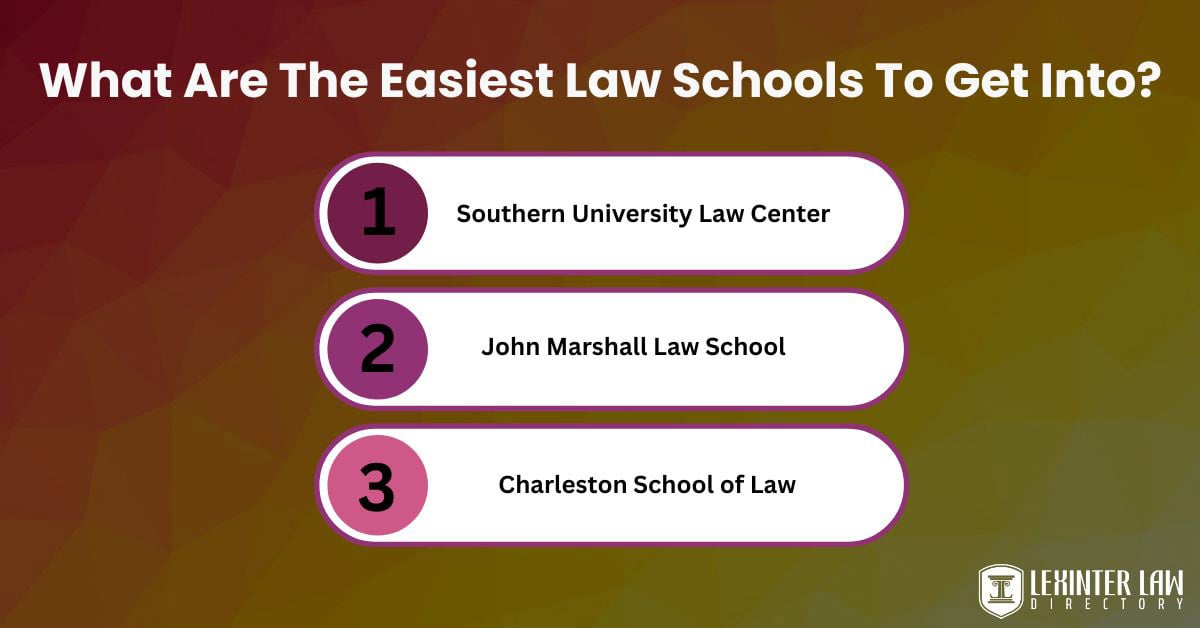
The three easiest law schools to get into are listed below.
- Southern University Law Center: Southern University Law Center is one of the easiest law schools to get into. The school has an acceptance rate of 70%, offering applicants with median LSAT scores of 143 and GPAs around 2.79. The moderate requirements and relatively high acceptance rates provide access to law education for students with diverse academic backgrounds. The school’s affordability further increases its appeal to applicants across the country.
- John Marshall Law School: John Marshall Law School has an acceptance rate of 74%, making the institution one of the easiest law schools to get into. Applicants have a median LSAT score of 147 and a GPA of 3.08, with lower ranges at 145 LSAT and 2.75 GPA for the 25th percentile. A relatively high acceptance rate, paired with moderate academic requirements, offers students an attractive path to accessible law programs. Full-time tuition for residents is approximately $45,780 per year.
- Charleston School of Law: Charleston School of Law is one of the easiest law schools to gain admission to, with an acceptance rate of 74%. Applicants generally present median LSAT scores of 146 and GPAs of 2.89. The 25th percentile LSAT score is 143, with a GPA of 2.59, which offers flexibility for students with diverse academic backgrounds. Students must meet specific academic thresholds to ensure admission into the law program despite the moderate requirements.
How Can Lexinter Help You Find Nearby Lawyers?
Lexinter can help you find a nearby attorney by providing a powerful directory that connects people in need of legal representation with qualified lawyers across various fields of law. Each day, hundreds of thousands of individuals visit Lexinter to locate legal experts who assist them with their specific needs. Individuals seeking legal help search by city, state, or region. Lexinter allows potential clients to filter attorneys based on specific law categories. The directory offers extensive resources, whether someone is facing criminal charges or seeking to create a will. Attorneys listed in the Lexinter provide detailed information, including their office address, phone number, credentials, and hours of operation. Potential clients easily schedule in-person or phone consultations directly through the attorney’s profile.
Lexinter has become a trusted source for finding reputable attorneys, with over a million people visiting annually. Each premium listing includes links to the law firm’s Google My Business profile, social media accounts, and website. The premium listing ensures that potential clients find nearby attorney who are experts in their field before making a decision. Attorneys who proactively grow their web presence and reach new clients understand the value of listing their firm in high-authority directories like Lexinter.
Law firms seeking to increase their visibility benefit from listing their services, helping clients in need find legal representation swiftly.

